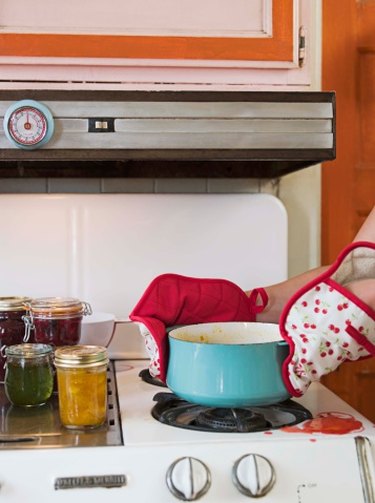
The right pot or pan can really make or break a home-cooked dish. Understanding the pros and cons of hard-anodized cookware will help you decide if this cookware is right for your needs. Anodization is a simple process that extends the life of your pots and pans and gives them a nonstick surface. Yet some people are concerned that anodized aluminum may have a negative impact on their health. These pros and cons are all important to consider when purchasing new cookware.
How Anodization is Performed
Video of the Day
Most anodized pots are made of aluminum or an aluminum alloy. The pot or pan is submerged in sulfuric acid and exposed to a low electrical current. This results in the production of aluminum oxide. The acid bath is then cooled and subjected to a stronger current. The resulting pan has a protective layer of hard-anodized aluminum on its surface.
Video of the Day
Less Sticking
After being anodized, a pan is coated with a smooth, nonstick surface. This surface also is nonreactive, making it less likely than other pans to discolor. Food will not stick or burn on hard-anodized pans and you won't have to stir or scrape as much as you would while cooking in other pans.
Durability
Hard-anodized pans are scratch and dent resistant. They are twice as strong as steel and dent less easily that traditional aluminum pans. They are also easier to wash because of their nonreactive properties. Hard-anodized cookware was the strongest cookware available on the market as of April 2011.
Health Concerns
The major con of anodized cookware is the potential health concern. Aluminum is a heavy metal and many consumers are concerned it will leach into their food and cause a health hazard. Anodized cookware has a protective layer locking in the aluminum, but this layer does not last forever. The risk of aluminum contaminating your food are generally considered negligible, but some consumers prefer to avoid them.